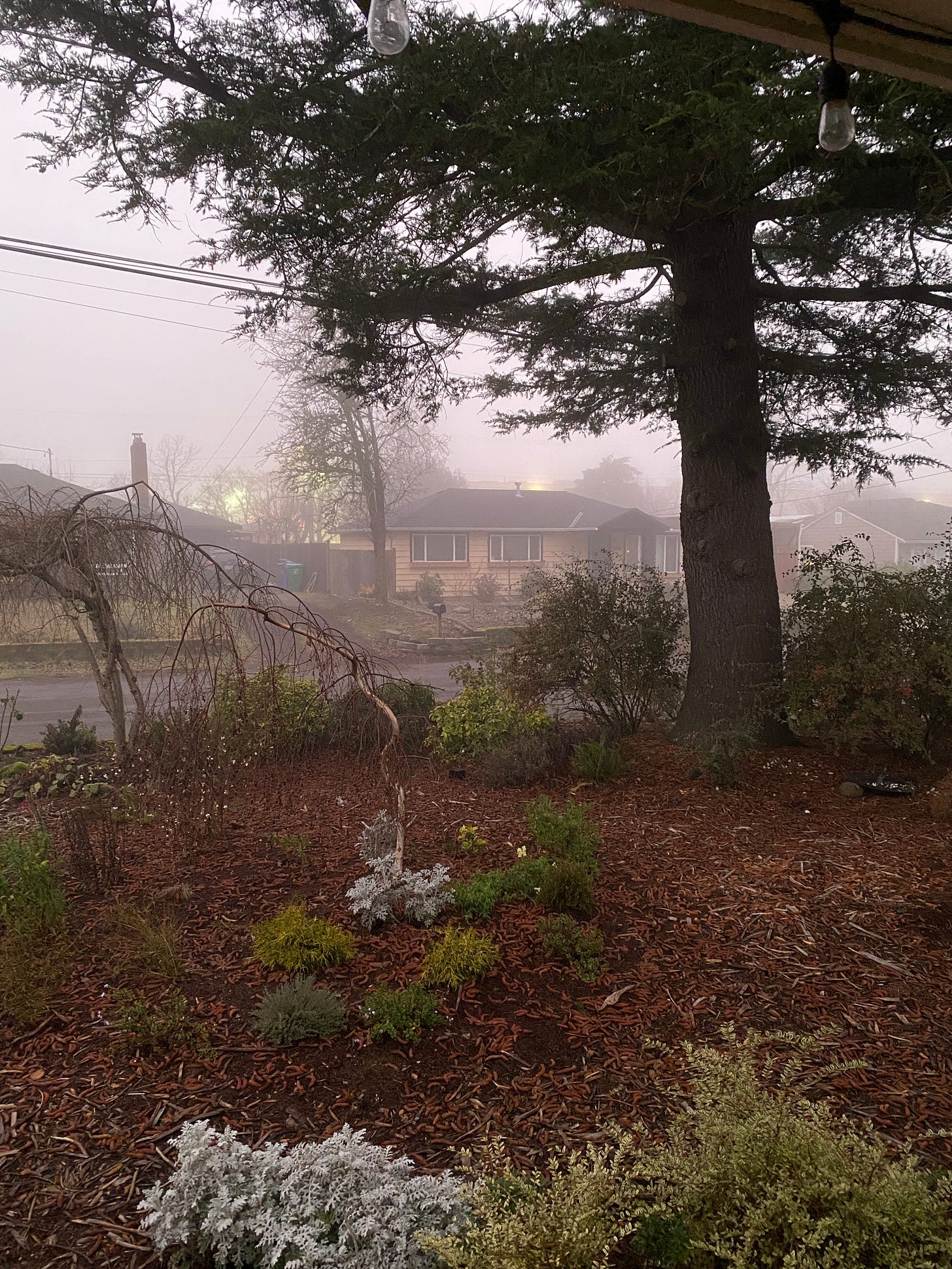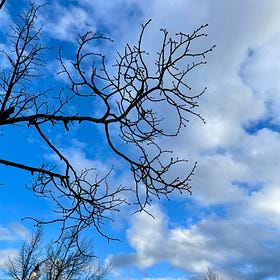Running on ice with knives
Learning how to live when it's the end of the world as we've known it
Last week, I had a lesson from the person I still think of as my skating coach, though I had only 3 or 4 lessons with him in all of 2024. No more than an hour of private instruction in a year, when in 2023 I had a half-hour lesson each week.
“So, how is skating going for you?” he asked.
Not, “What would you like to work on?” or “How are you?”—his usual ways of beginning a lesson.
I paused, considering how I wanted to answer.
“Pretty terrible,” I finally said. “I have to make myself come here. I’m not enjoying it much. I know the only way to get to a better place is to keep at it, but….” My voice trailed off. “Can I really get back to where I was?” I asked.
On November 15, 2023, during one of those previously-routine lessons, I fell attempting a simple hop required for a routine I didn’t want to perform in the first place (definitely a contributing factor to my fall). I went into it half-assed and landed on mine. I broke my wrist and hit my head, injuring my brain. The wrist healed within 6 weeks or so; my brain is still not fully recovered. I remain under the care of a physical therapist, an occupational therapist, and a vision specialist.
When I first returned to skating, I could only manage 20 minutes at a time. I learned that pushing beyond that pretty much guaranteed a migraine. Now, I can usually manage an hour. Sometimes I can skate longer, if I take breaks and there are only a few other skaters on the ice. (Navigating among moving objects is especially taxing.) I’ve learned to pay a different kind of attention to my body, to register the signals it sends me when I am pushing it too far, and then I get off the ice.
This is progress, and I see it and appreciate it.
But I cannot do most of the things I used to do, and I do not feel the joy I once did on the ice, and recovery has been so slow and long. I’ve yet to be able to finish my regular group class, and I cannot do many of the moves we work on there. Before the fall, I could do all of them, and most with speed and confidence. I could skate big. Now, because of my on-going vestibular challenges, turning—even from moving forward to backwards—is sure to make me feel pretty ooky. Spinning is out of the question. I now skate much smaller.
Do you know how unsatisfying it is to skate—really skate—going only forward? Especially when you can remember when jumping felt like flying?
Near the end of last week’s lesson, in which I focused on two previously simple moves that I now cannot do easily or with any grace, I broached the subject of fear.
“I just don’t enjoy skating like I did because I’m afraid in ways I’ve never been afraid,” I said. “The only time I don’t feel it is when I’m forward stroking, and on crossovers after I’ve warmed up.”
“Yeah,” my coach said, “I can see that. And the thing about fear is, when we’re afraid we tense up. That makes us skate on top of the ice, rather than into it, and that’s when our blades can slip.” He demonstrated the difference, so I could see his blade cutting into the surface, hear the ripping sound his edges make.
“It’s just, I never had a sense of the danger before,” I said. “It was such a small fall, and so stupid. But the impact of it, on my whole life. I didn’t know, before, what a fall could mean, how it could change everything—and now I do. And it can happen at any time.”
He simply nodded. Yes.
“So how do I get myself back to skating into the ice?”
His suggestion was to start consciously digging in on things where I don’t feel fear—forward stroking, slaloming, crossovers. Dig in deeper on the things I know I can do, the things that I can do with speed and joy. Make my brain more aware of what my body is doing—the way I’ve learned to pay attention to the signals it gives me when I’m pushing it too much. Then, start trying to do the same with the things that aren’t as comfortable yet.
His advice makes very good sense to me because if I had to choose a word for the year of 2024, it would be “neuroplasticity,” key to my physical rehab and my work in lessening chronic pain. My fall destroyed existing neural pathways I depended upon and took for granted, and trauma has ingrained others I could well do without, but the good news I learned in the year after my fall is that our brains are constantly shedding and building pathways, and it is work we can actively assist with.
I’m thinking a lot about that as we collectively grapple with so many difficult things. As Los Angeles burns, as our criminal President-elect is about to retake office, as it becomes clear that those who had power to hold him accountable did not, as those with grotesque amounts of wealth dismantle democratic guardrails and norms to acquire even more of it, and as I absorb the truth that my country and government will never again be the one I once felt safe living within, I’ve been thinking a lot about skating. The truth is, I’ll probably never skate again the way I did before my fall.
Maybe I shouldn’t.
I can see now the ways in which I skated recklessly or thoughtlessly. I can see the ways in which I didn’t fully appreciate what I had and could do, and the ways in which I didn’t understand the kind of skater I am now. Too often, my head was stuck on ideas about skating that were based on the skater I’d been as a child, rather than on an understanding of the aging adult skater I am now.
I’m thinking about what it means to dig into life when we know of its dangers in ways we never did before, but before we’ve had time to develop new networks we need to be secure in it.
I’m thinking about how to live in the ways my coach and physical therapist and occupational therapist have suggested I skate: Going deeper on the things I know I can do, the things I can do with joy. Going slowly, and with small steps, on things that feel shaky. Holding onto the wall if I have to, reminding myself that everything counts for building new neural pathways. Listening to my body’s signals and taking breaks when it is telling me that I need one. Better understanding the risks and rewards of what I’m doing.
(I mean, my God, my hobby is strapping knives to boots and running on ice in them! But also: How much does this feel like an apt metaphor for living now, for how many of us?)
The more I think, the more I realize that my question for my coach— “Can I get back to where I was?”—is the wrong one. I need to let it go. I need to let the past and my ideas about it go.
“Where do I want to go now, and what can I do today to get me closer to that?” is the question I need to ask now.
So, how are we all doing these days? Seems like the shiny new year feelings are gone before they even really got here. I woke up yesterday to fog and bare trees and the bare-knuckle gut-punch that mid-January can be.
It’s been a rough, rough start to this new year, hasn’t it? (I won’t link to all the news. You already know.) So let’s lift each other up. Tell us the parts of life you can dig into. What are the things you can do with strength, confidence, and joy—no matter what is happening in the world and your life?
Or, you know, just tell me anything. I love to talk with you in the comments.
And please give us a heart (❤️) if you feel so moved. It warms mine when you do that, and it helps readers find me.
Oh, and just so you know I’m not a January hater, here’s a throwback from a year ago.





I used to be carefree, too. I also used to smoke too much and drink too much and lo-and-behold I aquired a low-grade and persistent anxiety that became so normal I didn't even know it was there until I met a guy who had to amputate a few fingers because of smoking-related nerve damage and all of a sudden that anxiety became all I noticed and of course it still took me a while to quit smoking and even longer to quit drinking, but it was like there was a switch, and once it was turned on I realized that there was so much risk/death everywhere (never mind what I was doing to myself, what with the smoking and drinking), and finding my way out of that fear and anxiety, well, I suppose what I am saying is that yes, knives-boots-ice-running, and thank god for books and pen and paper and decaf Americano's and walks in the arboretum with my wife and the ability to pick up a guitar and sing myself a lullaby.
Rita, I love this post so very much. I appreciate that you are willing to grow and change and face hard things and cheer us on for doing the same. I love your resiliency in the face of challenges. I love how you spin a metaphor. The idea of digging into the thing we can with confidence, while slowly (re)building our skills (or not, as wisdom and circumstances allow) resonates deeply is such a life lesson. And one I needed this week.
XOXO.